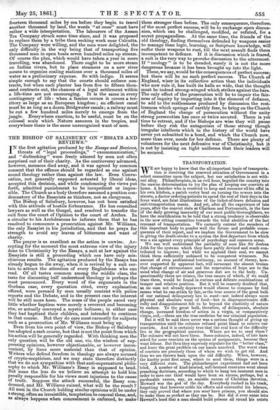THE BISHOP OF SALISBURY ON " ESSAYS AND REVIEWS."
Ithe first agitation produced by the Essays and .Reviews,1 threats of " legal proceedings," " excommunication," and " disfrocking " were freely uttered by men not often surprised out of their charity. As the controversy advanced, however, menaces died away, and it was agreed by common consent that the offence should be regarded as one against sound theology rather than against the law. Even Convo- cation, not generally supposed actuated by liberal ideas, accepted this decision, and while condemning the views put forth, admitted punishment to be inexpedient or impos- sible. The Church as a body therefore assumed a position con- demnatory of the Essayists as thinkers, not as clergymen. The Bishop of Salisbury, however, has not been satisfied with this attitude of hostile forbearance. He has consulted lawyers as well as the Gospel, and resolved to transfer the suit from the court of Opinion to the court of Arches. In a circular to his Archdeacons he informs them that he has resolved to commence a prosecution against Mr. Williams, the only Essayist in his jurisdiction, and that he prays for strength to avoid any leaven of bitterness and want of charity.
The prayer is as excellent as the action is unwise. Ac- cepting for the moment the most extreme view of the injury done to Christianity by the Essays, a suit at law against the Essayists is still a proceeding which can have only mis- chievous results. The agitation produced by the Essays has already begun to die away, when it is revived by a suit cer- tain to attract the attention of every Englishman who can read. Of all tastes common among the middle class, the taste for discussing half understood theology is perhaps the most pronounced. Every word of the arguments in the Gorham case, every quotation cited, every explanation offered, were perused by men usually content with police reports and the Debate, and in the present case the interest will be still more keen. The mass of the people cared very little whether baptism were merely a reverent and becoming rite, or actually conveyed a mystic holiness ; in either case they had baptized their children, and intended to continue in that course. But they do care most earnestly for subjects such as a prosecution of Mr. Williams must bring up. Even from his own point of view, the Bishop of Salisbury has adopted a rash course, but that is not the point from which his action will be generally regarded. With thinking men the only question will be the old one, viz. the wisdom of sup- pressing opinions, however objectionable, or however incon- venient, by force more material than that of opinion. Writers who defend freedom in theology are always accused of crypto-scepticism, and we may state therefore distinctly that we do not sympathize with that anti-supernatural philo- sophy to which Mr. Williama's Essay is supposed to tend. But none the less do we believe an attempt to hold him penally responsible for his views most injurious to the cause of truth. Suppose the attack successful, the Essay con- demned, and Mr. Williams ruined, what will be the result ? All men in the Church holding similar opinions will be under a strong, often an irresistible, temptation to conceal them, and, as always happens when concealment is enforced, to make them stronger than before. The only consequence, therefore, of the most perfect success, will be to exchange open discus- sion, which can be challenged, modified, or refuted, for a secret propagandism. At the same time, the friends of the old theology, finding themselves defended by weapons easier to manage than logic, learning, or Scripture knowledge, will suffer their weapons to rust, till the next assault finds them incompetent to defence. If it is discussion which is feared, a suit is the very way to provoke discussion to the uttermost. If " neology " is to be dreaded, surely it is not the more dangerous because it has been brought up into the light. These, we say,would be the consequences of perfect success; but there will be no such perfect success. The Church of England, wiser in its collective action than the individuals who now rule it, has built its halls so wide, that the thought must be indeed strong-winged which strikes against the bars. The only effect of the prosecution will be to impair the fair- ness of inquiry by importing into it the element of defiance, to add to the restlessness produced by discussion the rest- lessness which springs of earthly fear, to bring on the Church of England the charge of persecution without the unity strong persecution has once or twice secured. There is yet time to retreat, and if the Bishops are wise they will pause before they risk the antagonism of those strong though irregular intellects which in the history of the world have never yet submitted to a bond, and which the Church now, more than ever, needs for her defence. There are plenty of volunteers for the next defensive war of' Christianity, but it is not by insisting on tight uniforms that their leaders will be secured.






























 Previous page
Previous page